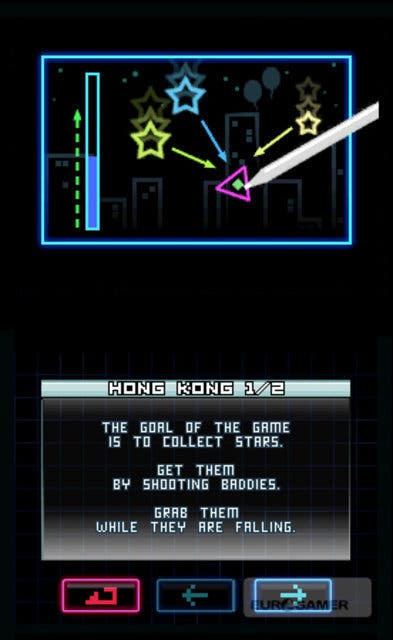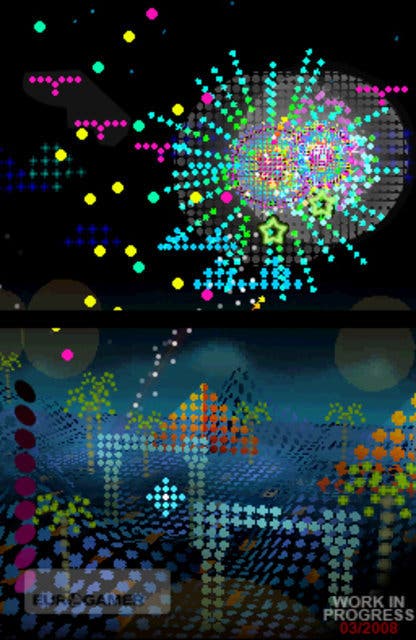Big Bang Mini
Not a sparkler.
Big Bang Mini ought to be one of those games your DS was made for. It's got a control system that wouldn't work on any other console. It's got gameplay that's easy to pick up and perfect for quick blasts. It's got fireworks, falling stars, flying pandas, pirate snowmen, rabbits wearing 3D glasses and a giant walrus riding on a magic carpet, who's sporting a rainbow-coloured mohican and a leather jacket. So why isn't it brilliant?
Let's start by looking at how the whole thing works. Enemies appear on the top screen, raining down missiles of various shapes and sizes. You control a small icon on the bottom screen, touching and dragging with the stylus to move it around and avoid contact with the missiles. The stylus is also used to shoot back at your enemies; you touch the screen and swipe upwards in the direction you want to fire.
The temptation is to fire away with wild abandon, confident in the knowledge you'll hit something sooner or later. Except in Big Bang Mini, you are your own worst enemy. If one of your missiles fails to make contact with an object on the top screen, it'll explode into dozens of tiny pieces. These fall right back down on top of you and they're just as lethal as enemy fire. To make matters worse, it's sudden death if you mess up. There are no extra lives or health meters. Make the slightest contact with the tiniest missile and you have to start the level all over again.
When you do successfully destroy enemies, they turn into falling stars. Catching these with your icon fills up a meter on the left-hand side of the screen, and when it's full, you've completed the level. As the game progresses you get the option to use various power-ups. Some of these are permanently available, like the homing missile you activate using the L or R buttons. Others only apply in some sets of levels, like the enemy-sucking vortex you create by drawing a spiral on the touch screen.

As such, it's a game of multi-tasking. You're constantly switching between shooting and moving your icon, either out of harm's way or into the path of a falling star. The concept is simple enough to grasp, but the control system is a little tricky at first. The touch screen doesn't always seem to recognise your swiping gestures, and manoeuvring your tiny icon about is fiddly. However, it only takes a little practice to get the measure of how much precision and deliberation is required, and then completing levels becomes a simple task.
Too simple, in fact. The initial incline of the difficulty curve is so gentle that you're soon just going through the motions, polishing off each level without having to think too hard or overcome any serious challenges. It doesn't help that new power-ups are only introduced every ten levels, and that some are only temporarily available, or that enemy attack patterns don't tend to vary much.
The visuals are pretty enough, with plenty of nice sparkly explosions plus the aforementioned pandas, pirate snowmen and so on to enjoy. The music is original and funky (the retro electro beats of the Luxor levels are a particular highlight). But quality presentation isn't enough to make up for the fact that, fundamentally, Big Bang Mini is a bit boring. It may have many qualities of a great DS game, but it's missing one of the most important ones - it's just not addictive.
In the earlier levels, this is because the objectives are too easy. Even the boss levels rarely require more than a few attempts, so there's little challenge and not much of a sense of reward. But just as things start to get a little more interesting, the difficulty curve begins to spike wildly. You'll find yourself stuck, seemingly endlessly, on levels where projectiles fall at ridiculous speeds, while enemies put up shields which are almost impossible to shoot past. Only to find the following level is tediously easy to complete.

The main problem, however, is that the later levels force you to focus all of your attention on the bottom screen. Thanks to the velocity and quantity of the missiles, moving your icon out of harm's way becomes a full-time job. There's certainly no time to enjoy the pretty animations or wacky characters. Glance at the top screen to try to see where enemies are or monitor their attack patterns, and chances are you're done for. The only way to score a hit becomes to fire blindly whenever you get the chance. This, of course, creates yet more projectiles which have to be avoided.
This is where the sudden death mechanic really begins to grate, and where serious frustration starts to set in. The gameplay becomes entirely about dodging stuff and taking potshots rather than developing attack strategies and aiming well. Completing levels is more down to luck than skill. The level of reward isn't high enough to give Big Bang Mini that just-one-more-go factor.
If you've got massive amounts of patience and skill you might enjoy this game, but we're talking the kind of patience and skill required to solve Rubik's cubes in the dark and balance marbles on tightropes. Some of the best DS games have the simplest concepts, the most repetitive gameplay and the most basic visuals - think Tetris, Picross and, I can't live a lie any more, Diner Dash. But they also have finely tuned difficulty levels and perfectly balanced challenge and reward systems, and those things are missing from Big Bang Mini. There's a spark of originality here, and that's to be commended. It's just a shame it doesn't burn bright or long enough to make Big Bang Mini a great game.








